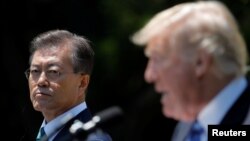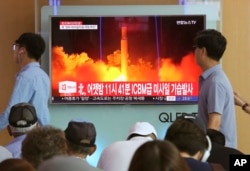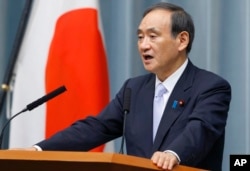South Korean President Moon Jae-in has reacted with quiet restraint to increasing talk of conflict over the rapidly advancing North Korean nuclear threat, and in particular over U.S. President Donald Trump's remarks threatening an overwhelming military response.
The North Korean People's Army Thursday released more detailed plans for a missile strike near the Pacific territory of Guam.
According to the state news agency KCNA, North Korea is planning to fire four intermediate-range missiles over Japan to land 30-40 kilometers (19-25 miles) from the U.S. territory of Guam, located in the Pacific Ocean 3,000 kilometers (1,900 miles) southeast of the Korean Peninsula.
The army plan, that will be presented to North Korean leader Kim Jong Un by mid-August, is different than past threats against the United States in that it outlines a very specific missile test operation.
Guam is home to about 163,000 U.S. citizens and a U.S. military base that includes a submarine squadron, an air base and a Coast Guard group.
The North Korean military also called President Trump's warning this week that Pyongyang would face “fire and fury” if it threatened the United States a “load of nonsense.”
The KCNA report said of Trump, “Sound dialogue is not possible with such a guy bereft of reason and only absolute force can work on him.”
Reluctant Seoul
The risk of military conflict between the United States and North Korea is increasing as Pyongyang moves closer, and faster than expected, to developing a nuclear intercontinental ballistic missile that can reach the mainland United States. This week U.S. intelligence sources say North Korea has produced a yet-to-be-tested miniaturized nuclear warhead, something that analysts had previously speculated was years away from development.
Military leaders in Seoul Thursday condemned North Korea's recent threats as “thoughtless words” and emphasized South Korea's willingness to act in response to an attack on its U.S. ally.
“We are fully prepared with a readiness posture able to immediately and firmly punish any kind of North Korea provocation,” said Roh Jae-chun, spokesman for South Korea's Joint Chiefs of Staff.
However President Moon did not make any public comments on this matter and he did not attend the Thursday meeting of his National Security Council (NSC) that a presidential spokesman clarified was not an emergency session, but a “regular weekly meeting” presided over by NSC Director Chung Eui Yong.
Moon also waited 10 days to talk to President Trump after North Korea conducted its second ICBM test July 29 because he was on vacation at the time.
In an editorial Thursday the Korea Joongang Daily newspaper in Seoul criticized Moon for the “lax attitude he has toward an undeniable emergency.”
Diplomacy rejected
The liberal South Korean leader took office in May with expectations to reduce tensions on the Korean Peninsula through increased diplomacy. But his ability to offer economic incentives like reopening the Kaesong Industrial Complex have been impeded by international sanctions, and his calls for dialogue with Pyongyang have been rejected.
“There is no really good and effective independent unilateral option that the South Korean government can take,” said Bong Young-shik, a political analyst with the Yonsei University Institute for North Korean Studies in Seoul.
The Moon administration has moved to embrace the U.S. emphasis on increased sanctions and military deterrence. However it has for the most part refrained from commenting on the possibility of a U.S. pre-emptive strike against North Korea, even though such action would likely provoke a deadly counter attack against the South.
“Obviously the South Korean government does not support (a U.S. pre-emptive strike). Most South Koreans do not support it,” said security analyst Shin In-kyun with the Korea Defense Network.
North Korea's increasingly threatening military buildup, Shin says, has made Moon more reliant on the United States for it security and less able to seek an independent path.
Tokyo agreement
Meanwhile, Japanese Chief Cabinet Secretary Yoshihide Suga reaffirmed Thursday his country's close alliance with the United States and agreement with President Trump's “maximum pressure” policy against North Korea.
“President Trump has said ‘all options are on the table.’ We, as a government, welcome this stance. We believe it is extremely important for the Japan-U.S. alliance to strengthen its deterrent power and ability to respond," he said.
The Kyodo news Agency also reported Thursday that the country's defense minister, Itsunori Onodera, said Japan could legally intercept a North Korean missile headed towards Guam. But experts say the Japanese military does not currently have the capability to shoot down a missile in high altitude.
Youmi Kim contributed to this report







